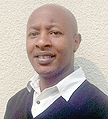As an explanation of the origins of the universe and the earth, the big bang theory seems rather ridiculous to say the least. Still, I do maintain a more than healthy respect for all things scientific. Unlike the arts, it’s hard cold facts with science. I find that very re-assuring and satisfying.


As an explanation of the origins of the universe and the earth, the big bang theory seems rather ridiculous to say the least. Still, I do maintain a more than healthy respect for all things scientific. Unlike the arts, it’s hard cold facts with science. I find that very re-assuring and satisfying.I know that when I drop a stone in water it will sink and if I really care why, all I have to do is look up Archimedes’ principle. The explanation is there complete with a formula. I know better than to argue with a smart guy’s findings. He put the hours in so I don’t need to. He deserves all the respect he can get.Now if I saw an apple falling from a tree I know exactly what I would do. I would instinctively put out my hands to break the apple’s fall lest it get damaged; a gentle wipe with the palms would suffice and crunch my teeth would go quickly sinking into nature’s gift. The whole episode would last approximately 2-3 minutes including all the time it would take me to wipe my mouth and fingers in delight and appreciation of God’s generosity.A fellow named Isaac Newton had other ideas. Apparently, he was inspired by this very simple occurrence of an apple falling off a tree to investigate how far gravity extended in the universe! Don’t you just love these science geniuses? The same chap had the time to advance theories in mathematics, study the speed of sound and still spared some time to conduct experiments in separating white light into the colour spectrum!The average Joe and Jane in their right minds would be well served to enjoy the daily comforts that have resulted from scientific research without questioning any of it, right? That’s exactly what I thought until a little while ago.This week it emerged that 80 per cent of our DNA is indeed active. Previously, the focus of research was on genes which comprise about 2 per cent of DNA. The rest was referred to as ‘junk DNA’ as no one could figure out what it did.After ten years of research by 400 experts in 32 labs across five countries, it turns out that ‘we’ were mistaken all along! With all due respect to these experts’ findings, this revelation leaves me with more questions than answers.It reminds of the earlier scientific mishaps like the assumption that the earth was flat or the sun revolved around the earth. It’s easy to laugh at these misconceptions today but there was a time in human history that they were taken as conventional truths. Men like Nicolaus Copernicus and later Galileo Galilee risked their reputations to disprove these erroneous assumptions.For his troubles, Galileo was accused of heresy and confined to house arrest until his death. He whiled the hours away by documenting his work of 40 years on ‘Kinematics’ and ‘strength of materials’.Events in history show that as the human race collectively makes advances in science and technology, we are constantly reminded of how little we know about the world we live in. While we endeavour to conquer space and the other planets, a lot of homework awaits us right here on earth.The areas of nanotechnology and molecular biology are getting a lot of research dollars allocated to them today. The United States, European Union and Japan have invested a total of USD 5.65 billion in nanotechnology alone.In the realms of science space exploration and nanotechnology are at opposite ends. For lack of a better metaphor, one is the ‘big picture’ (space exploration) and the other the ‘small picture’ (nanotechnology).Both are equally important and indeed complement each other in helping man to better understand the world around us.Unfortunately, we live in a world where economics is king. With finite resources and insatiable needs, something is got to give. Every scientist will tell you that their area of research will change the course of human kind.Ultimately the decision falls to the money men. For all their good intentions, financiers will always allocate funds to whoever makes the stronger case. That is not to say they are necessarily the most deserving. Like all other spheres of life, politics bares it’s not so clean hand in all matters scientific.Scientists today may not fear house arrest as in the times of Galileo but they have to pander the research to please politicians and financiers. This brings into question whether findings are not fine tuned to suit the tastes of patrons.To loosely translate a Kinyarwanda saying, "no one argues with their undertaker”! Such is the dilemma of modern science. The tenets of sanctity that surrounded earlier scientific revolutions are no more. Today when a new breakthrough is made, often its credibility entirely depends on who paid the bills instead of focusing on the efficacy of the science behind the discovery.While the science world marvels at all the opportunities presented by the new discovery ushered in this week by the Encode project studying the Genome and DNA, laymen such as you and me should take a more than passing interest in these announcements. The future of humanity depends on them.As it is with other social interest issues that define political debate, science deserves its place at the table. It should not be relegated to obscure labs and warehouse offices of wacky venture capitalists looking to discover the ‘next big thing’.Science and technology needs to come to the mainstream and be held up for scrutiny as much as education and healthcare.When our grand children ask, "who decided to put space exploration ahead of renewable energy research”? I hope we will have a better answer for them than "Ntagombizi!”


